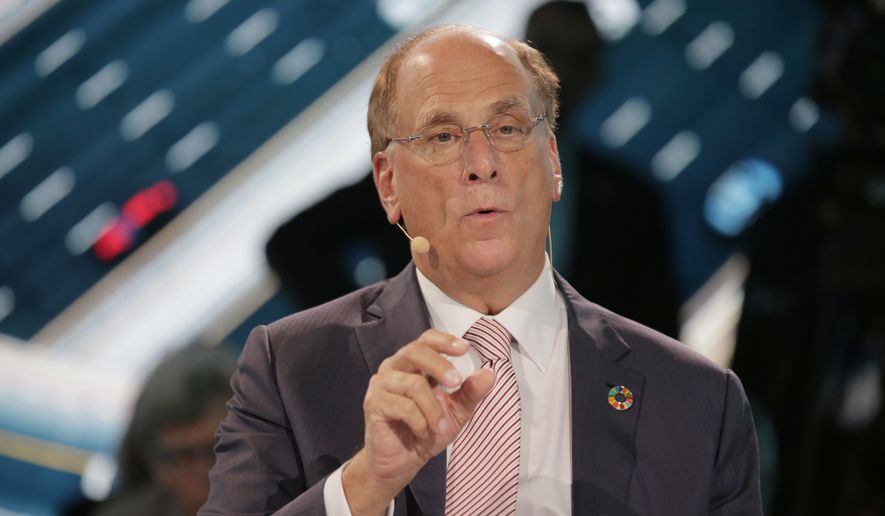A consumer watchdog group has started a multimillion-dollar campaign against BlackRock, the world’s biggest money manager, for hectoring American businesses about leftist causes while investing in Chinese companies with poor records on human rights and the environment.
Consumers’ Research is rolling out advertisements, billboards in New York City and a website, BlackRockLovesChina.com, that say BlackRock and its executives preach one thing at home while turning a blind eye to abuses in China.
“No amount of woke posturing can hide what BlackRock is really up to,” said Consumers’ Research Executive Director Will Hild. “The idea that an American company is taking billions of dollars and using it to bet on China’s success is extremely concerning. Funneling Americans’ hard-earned retirement savings to China is unsafe from both a national-security and financial perspective.”
It is not clear how much money BlackRock may be investing in China and its companies, although it is reportedly a small fraction of the more than $9.6 trillion in assets that the firm manages. BlackRock’s China A Opportunities Fund has more than $47.4 million, according to its most recent report.
The company did not respond to questions about its investments in China, which is the world’s largest producer of greenhouse gases and has been accused by human rights groups and Congress of using slave labor to produce some products.
Published reports show BlackRock invests in at least two Chinese companies, iFlytek and Hikvision, that have been added to the U.S. “entity list” for national security and foreign policy reasons, such as surveillance and poor treatment of the minority Uyghur population in China. It is not illegal to invest in such companies, which are prohibited from buying and selling U.S. goods.
By arrangement with the Chinese Communist Party, BlackRock now has a retail fund presence in China. The asset manager told CNBC in September that it had raised more than $1 billion from more than 100,000 Chinese consumers.
“Putting money into surveillance companies used by the Chinese military,” says the 30-second Consumers’ Research ad, citing a Wall Street Journal report.
The ad features screenshots of BlackRock CEO Larry Fink.
“Larry Fink loves to tell Americans how to live, but he negotiated against America,” says the campaign, titled “BlackRock: Taking Your Money; Betting on China.”
The campaign joins a growing chorus of investors who criticize BlackRock’s expanding presence in China and its relationship with Communist Party leaders. In September, left-wing billionaire George Soros wrote in The Wall Street Journal that the money management giant’s growing presence in China is “a tragic mistake” that could “damage the national security interests of the U.S. and other democracies.”
BlackRock has considerable Wall Street muscle, which Mr. Fink flexes in his influential annual letter to CEOs. He has regularly pressured American business leaders to toe a leftist line on global warming and, more recently, racial issues.
In his 2021 letter, he consistently stresses “stakeholder” over “shareholder” value.
“Given how central the energy transition will be to every company’s growth prospects, we are asking companies to disclose a plan for how their business model will be compatible with a net-zero economy — that is, one where global warming is limited to well below 2ºC, consistent with a global aspiration of net-zero greenhouse gas emissions by 2050,” he wrote.
Mr. Fink made a similar plea with regard to race.
“As you issue sustainability reports, we ask that your disclosures on talent strategy fully reflect your long-term plans to improve diversity, equity and inclusion, as appropriate by region,” he wrote.
BlackRock does not brag to U.S. investors about Mr. Fink’s relationship with China’s Communist Party leaders, Consumers’ Research said.
“We cannot let executives like Larry Fink try and tell Americans how to live while simultaneously cozying up to one of the world’s leading human rights abusers,” Mr. Hild said. “By putting BlackRock’s shady dealings out in the open for all to see, we’re sending a message that companies won’t get away with taking advantage of hardworking Americans. Any company trying to use woke politics to mask their misdeeds should see this campaign and know they could be next.”
Consumers’ Research, a conservative-leaning nonprofit, describes its mission as increasing “the knowledge and understanding of issues, policies, products and services of concern to consumers and to promote the freedom to act on that knowledge and understanding.”
The group has targeted businesses it says are putting a greater priority on virtue signaling than improving their products and bottom lines for consumers and investors. Other campaigns have been directed at American Airlines, Coca-Cola, Nike and Ticketmaster. It campaigned against Major League Baseball after the 2021 All-Star Game was moved to protest Georgia’s voting laws.
BlackRock is particularly profitable with its hypocrisy, said William Flaig, who runs the American Conservative Values ETF fund, which steers clear of stocks in companies it believes are taking flagrantly political positions.
“They say they care about these things, and then they invest in China, which doesn’t care about these things at all,” Mr. Flaig said. “BlackRock’s just in it because they can make more money. Do they really care about all this, or is it just that they can charge higher fees?”
Mr. Flaig was referring to what Morningstar, in its 2020 Fee Fund Study, called a “greenium,” in which investors pay higher fees to funds that trumpet environmental positions.
Although fees for funds emphasizing “sustainability” have fallen 27% in the past decade, they trail the 38% reduction in management fees overall, according to Morningstar’s research.
Mr. Fink said the “greenium” makes sense from a long-term perspective. In his most recent letter, he pointed to an accelerating rate of investment globally in “sustainable assets.”
BlackRock’s shares were trading around $964 on Monday, just off its 52-week high. The China A Opportunities Fund has returned 32.05% since its inception in December 2018, according to its financial reports.
• James Varney can be reached at jvarney@washingtontimes.com.




Please read our comment policy before commenting.